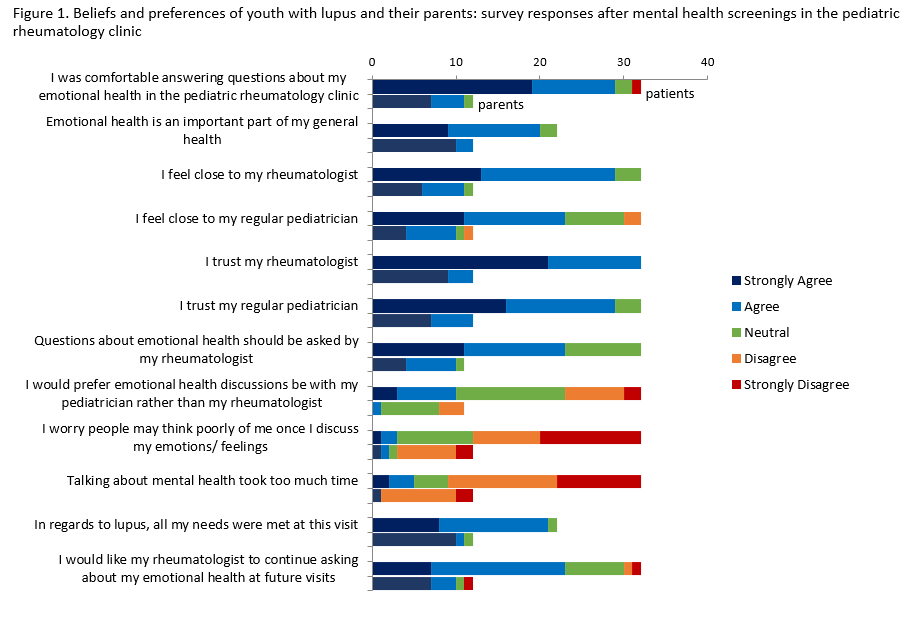Session Information
Date: Monday, October 22, 2018
Title: 4M084 ACR Abstract: Pediatric Rheum–Clinical I: Outcomes & Comorbidities (1846–1851)
Session Type: ACR Concurrent Abstract Session
Session Time: 2:30PM-4:00PM
Background/Purpose: Despite high rates of depression and anxiety in pediatric lupus, standardized mental health screening is not routinely practiced by pediatric rheumatologists. Our objectives were to screen youth with lupus for depression and anxiety in pediatric rheumatology clinics and assess patient and parent acceptability of screening in this clinical setting.
Methods: In a multi-center study of 6 collaborating clinics from the Childhood Arthritis and Rheumatology Research Alliance, patients with lupus ages 12-21 years were consecutively screened with the Patient Health Questionaire-9 (PHQ9) for depression and the Generalized Anxiety Disorder 7-item scale (GAD7) for anxiety. Screens were administered by tablets prior to and reviewed during clinical visits. Patient reported outcomes (PROs) for depression, anxiety, fatigue, pain, and physical and social functioning were collected using the Patient Reported Outcomes Measurement Information System. Correlation analyses examined the relationship between these PROs, the PHQ-9 and GAD-7 scores. Follow up surveys emailed to patients and/or parents assessed acceptability of screening. All patients had to meet either the ACR SLE Classification Criteria or the SLICC Classification Criteria.
Results: Fifty-three patients were screened and follow up surveys completed for 74%. The median age was 16.2 years, 87% were female, and 75% were of minority race/ethnicity. Of those screened, 26% screened positive for depression, 19% for anxiety, and 15% had suicidal ideation. Only 17% of patients reported previously screenings by their general pediatricians; 15% were newly identified as having symptoms of depression or anxiety. PHQ9 and GAD7 scores were highly correlated to PROs of fatigue (r=0.7, p<0.0001; r=0.6, p<0.0001) and pain interference (both r=0.5, p<0001) as well as depression (r=0.7, p<0.0001; r=0.7, p<0.0001) and anxiety (r=0.6, p<0.0001; r=0.7, p<0.0001) (Table 1). In follow up surveys, 91% felt comfortable being screened by their rheumatologist, and 74% felt they should continue to be routinely screened by their rheumatologist (Figure 1).
Conclusion: Mental health screening in pediatric rheumatology clinics may improve symptom detection for depression, anxiety and suicidal thoughts in young patients with lupus. Screening in this setting was important and acceptable practice to patients and parents across diverse demographics. Using patient-reported outcome measures alongside validated mental health screening tools may enhance our understanding of mental health in these patients.
|
Table 1. Correlations between depression (PHQ9) score, anxiety (GAD7) score, and patient reported outcomes in youth with lupus |
||
|
PHQ9 score |
GAD7 score |
|
|
GAD7 score |
0.8, p<0.0001 |
1.00 |
|
PROMIS measures: |
||
|
Worse depression |
0.7, p<0.0001 |
0.7, p<0.0001 |
|
Worse anxiety |
0.6, p<0.0001 |
0.7, p<0.0001 |
|
Worse fatigue |
0.7, p<0.0001 |
0.6, p<0.0001 |
|
Stronger peer relationships |
0.2, p=0.6 |
0.1, p=0.6 |
|
Lower physical functioning |
0.4, p=0.003 |
0.3, p=0.02 |
|
Higher pain interference |
0.5, p=0.0004 |
0.5, p=0.0002 |
|
Higher pain severity |
0.4, p=0.003 |
0.4, p=0.002 |
|
PHQ9 (Patient Health Questionnaire-9) scores ranged from 0-27; GAD7 (Generalized Anxiety 7-item scale) scores ranged from 0-21. PROMIS (Patient Reported Outcome Measurement Information System) scores were measured as T-scores, except for pain severity measured on a scale of 1-10. Spearman rho correlation coefficients shown. |
||
To cite this abstract in AMA style:
Rubinstein T, Dionizovik-Dimanovski M, Smith C, Kraus R, Jones JT, Harris J, Rodriguez M, Faust L, Rutstein B, Puplava R, Tesher M, Davis AM, Onel K, Sule S, von Scheven E, Knight AM. Screening Youth with Lupus for Depression and Anxiety in Pediatric Rheumatology Clinics [abstract]. Arthritis Rheumatol. 2018; 70 (suppl 9). https://acrabstracts.org/abstract/screening-youth-with-lupus-for-depression-and-anxiety-in-pediatric-rheumatology-clinics/. Accessed .« Back to 2018 ACR/ARHP Annual Meeting
ACR Meeting Abstracts - https://acrabstracts.org/abstract/screening-youth-with-lupus-for-depression-and-anxiety-in-pediatric-rheumatology-clinics/

